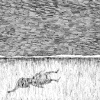Bond scripts don't require the audience to make sense of plot holes - the sense is generally implicit. I highly doubt this was designed to require us work it out, it just turned out that way no doubt due to multiple re-writes and lazy/lat minute finishing. If I didn't know better I'd assume that final act was written during a writer's strike
My point re the graffiti is that this scene is designed to have Bond making his own way to Blofeld in the basement. So what were the goons going to do- show him the way in and then wait at the entrance? Lots of loose ends.
But if so that would've been a better solution than inexplicably breaking the plastic cuffs, making the goons look like idiots, making the audience feel like they've missed something and changing the rules meaning that Bond may now do stuff without any explanation/inter-textual rationale.
At least having the goons wait at the door might have created a sinister foreboding of what awaits him inside (which would be far more in keeping with the wonderful sense of sinister foreboding that carries throughout the previous acts (the funeral and the lake in particular).
Having him break the bonds is, as you say, to show him taking control (a misconceived 'Bond moment'). It complicates the flow - he's captured- now he's in control- now he's being controlled. It's all over the place!
They had him break the bonds without addressing ripple effects of that and missed an opportunity to bring back Spectre's foreboding tone. Sure, they eventually get back to that tone briefly when Bond finds Blofeld, but only after an unnecessary running about-following-the-graffiti-with-action-music scene. Like i said, the logic, the story and the tone is all over the place. It mistakes pace for tension, because you lose the tension when logic falters and the tone shifts on those messy story beats






